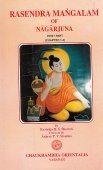Rasarnava, Rasārṇava: 6 definitions
Introduction:
Rasarnava means something in Hinduism, Sanskrit. If you want to know the exact meaning, history, etymology or English translation of this term then check out the descriptions on this page. Add your comment or reference to a book if you want to contribute to this summary article.
In Hinduism
Shaivism (Shaiva philosophy)
Source: Shodhganga: Mantra-sādhana: Chapter One of the KakṣapuṭatantraRasārṇava (रसार्णव) is the name of an Āgama or Tantra mentioned in the Kakṣapuṭatantra verse 1.5-7.—“At a previous time, when Pārvatī asked him, Śaṅkara told of the attainments of vidyā in the wide worldly life, in various ways. I observed each teaching taught also by the troops of Gods, Siddhas (those who have attained supernatural power), Munis (saints), Deśikas (spiritual teachers), and Sādhakas (tantric practicioners). They are [, for example]: Rasārṇava... I shall carefully extract all the above-mentioned āgamas, which are transmitted from mouth to mouth, like butter extracted from coagulated milk”.

Shaiva (शैव, śaiva) or Shaivism (śaivism) represents a tradition of Hinduism worshiping Shiva as the supreme being. Closely related to Shaktism, Shaiva literature includes a range of scriptures, including Tantras, while the root of this tradition may be traced back to the ancient Vedas.
Ayurveda (science of life)
Rasashastra (Alchemy and Herbo-Mineral preparations)
Source: History of Science in South Asia: Making Gems in Indian Alchemical LiteratureRasārṇava (रसार्णव) (lit. “treatise on the heart of mercury”) is the name of a 11th century alchemical work in Sanskrit.—The Rasaratnākara is one of the key works of the Indian alchemical discipline. It draws heavily on earlier alchemical works, such as the 10th-century Rasahṛdayatantra by Govinda, the anonymous 11th-century Rasārṇava, and the 12th-century Rasendracūḍāmaṇi by Somadeva. There are also numerous references to Ayurvedic works and authorities, as well as to Śaiva Tantric medical texts, such as the Kriyakālaguṇottara.

Āyurveda (आयुर्वेद, ayurveda) is a branch of Indian science dealing with medicine, herbalism, taxology, anatomy, surgery, alchemy and related topics. Traditional practice of Āyurveda in ancient India dates back to at least the first millenium BC. Literature is commonly written in Sanskrit using various poetic metres.
Languages of India and abroad
Sanskrit dictionary
Source: Cologne Digital Sanskrit Dictionaries: Aufrecht Catalogus Catalogorum1) Rasārṇava (रसार्णव) as mentioned in Aufrecht’s Catalogus Catalogorum:—alaṃk. by Siṃha Mahīpati. Burnell. 57^a. Oppert. Ii, 6598. ‘The nominal author is said to have been a Tanjore prince of the last century’.
2) Rasārṇava (रसार्णव):—med. Taylor. 1, 254. Oppert. 8208. Quoted in Sarvadarśanasaṃgraha Oxf. 247^a, in Ṭoḍarānanda W. p. 289, in Rasendracintāmaṇi W. p. 299.
3) Rasārṇava (रसार्णव):—alaṃk. by Siṃha Mahīpati. Gov. Or. Libr. Madras 74.
4) Rasārṇava (रसार्णव):—med. in 17 paṭala. Bl. 242. Stein 188. This is taken from some Tantra.
5) Rasārṇava (रसार्णव):—med. Ak 946. Bd. 909 (Devībhairavasaṃvāda).
Source: Cologne Digital Sanskrit Dictionaries: Monier-Williams Sanskrit-English DictionaryRasārṇava (रसार्णव):—[from rasa > ras] m. ‘ocean of Rasas’, Name of a medical [work]
[Sanskrit to German]
Sanskrit, also spelled संस्कृतम् (saṃskṛtam), is an ancient language of India commonly seen as the grandmother of the Indo-European language family (even English!). Closely allied with Prakrit and Pali, Sanskrit is more exhaustive in both grammar and terms and has the most extensive collection of literature in the world, greatly surpassing its sister-languages Greek and Latin.
See also (Relevant definitions)
Starts with: Rasarnavakala, Rasarnavasudhakara.
Ends with: Bhaktirasarnava, Rasarasarnava.
Full-text (+16): Rasarnavasudhakara, Rasarnavakala, Rasarasarnava, Simha mahipati, Vedhaka, Mamsavedha, Mamsa, Majja, Tvagvedha, Asthivedha, Nadivedha, Dhatu, Asthi, Raktavedha, Majjavedha, Dhatuvedha, Nadi, Tvac, Rakta, Gandhaka.
Relevant text
Search found 6 books and stories containing Rasarnava, Rasārṇava; (plurals include: Rasarnavas, Rasārṇavas). You can also click to the full overview containing English textual excerpts. Below are direct links for the most relevant articles:
Rasa Jala Nidhi, vol 5: Treatment of various afflictions (by Bhudeb Mookerjee)
Part 14 - Chemists of the Metallic School: Shambhu < [A Brief History of Indian Chemistry and Medicine]
Part 17 - Chemists of the Metallic School: Nagarjuna < [A Brief History of Indian Chemistry and Medicine]
Part 25 - Ar-Razi and the Indian knowledge of metallic chemistry < [A Brief History of Indian Chemistry and Medicine]
Dramaturgy in the Venisamhara (by Debi Prasad Namasudra)
Ārabhaṭī-vṛtti (fierce fights and outrageous deeds) < [Chapter 4 - Dramaturgy in Veṇīsaṃhāra]
Description of Prahasana < [Chapter 2 - Nature and Classification of Sanskrit Drama]
Patākā-Sthānaka < [Chapter 4 - Dramaturgy in Veṇīsaṃhāra]
Brihad Bhagavatamrita (commentary) (by Śrī Śrīmad Bhaktivedānta Nārāyana Gosvāmī Mahārāja)
Verse 1.4.12 < [Chapter 4 - Bhakta (the devotee)]
Cosmetics, Costumes and Ornaments in Ancient India (by Remadevi. O.)
1.3. Use of Madayantikā (Henna) < [Chapter 1 - Cosmetics]
1.1. Materials (a): Gold < [Chapter 3 - Ornaments]
The Sarva-Darsana-Samgraha (by E. B. Cowell)
Reviews < [July – September, 1984]
Related products

